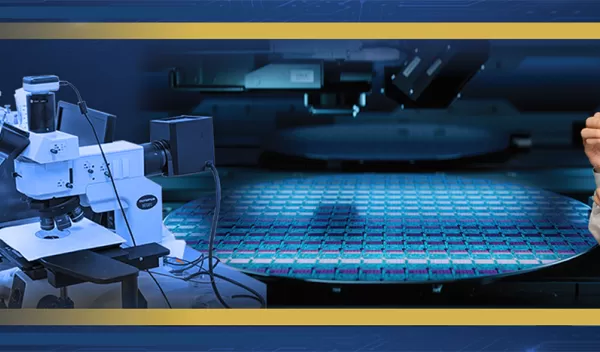
NSF invests $7.6M in educational projects to build a skilled semiconductor manufacturing workforce in partnership with Intel Corporation
Today, the U.S. National Science Foundation and Intel Corporation announced a $7.6 million investment in six projects to advance equitable STEM education and training opportunities that strengthen the nation's semiconductor workforce. This investment, made through a Dear Colleague Letter: Enhancing Engineering Technology and Advanced Semiconductor Manufacturing Technician Education (ETSTE), represents just one piece of a previously announced 10-year collaboration between NSF and Intel that will, over time, invest $100 million to address semiconductor design and manufacturing challenges and workforce shortages nationwide.
NSF's role in workforce training has become increasingly important, with significant investments in semiconductor manufacturing. Due to a nationwide shortage of semiconductors, the chip industry has struggled to meet the growing demand for chip-based products in the U.S., where only about 10% of the global supply is produced domestically. Through strong public-private partnerships, NSF is poised to address the needs of the future domestic semiconductor workforce through funding research and curriculum development across the nation's higher education institutions, including two-year colleges and four-year universities.
"Today's announcement reaffirms NSF's commitment to strengthen the U.S. workforce and ensure we have the knowledge and skills needed for innovative semiconductor design and manufacturing," said NSF Director Sethuraman Panchanathan. "This investment will support talent development across the semiconductor industry and improve education and training opportunities in technology fields that are crucial for our global competitiveness."
The projects are supported by two NSF programs — Advanced Technological Education (ATE) and Scholarships in Science, Technology, Engineering, and Mathematics (S-STEM) — through a public-private partnership between NSF and the Intel Corporation announced last year. Awards support full scholarships to students at two-year colleges and four-year universities and forge a modern approach to technician training programs and science, technology, engineering and mathematics education. The ETSTE DCL encourages submission of proposals through both ATE and S-STEM programs, in accordance with the instructions, requirements, and deadlines specified in their respective solicitation.
"This announcement underlines Intel’s ongoing efforts to strengthen the U.S. semiconductor workforce, specifically emphasizing technician training and support for community colleges. Intel invests in education and workforce development through private-public partnerships and ongoing collaborations with NSF. This initiative reflects Intel’s commitment to fostering innovation, driving economic growth, and preparing a skilled workforce to meet the evolving demands of semiconductor technologies. These efforts are crucial for maintaining a competitive semiconductor industry in the United States," said Richard Uhlig, senior fellow and director of Intel Labs at Intel Corporation.
Awardees will engage with Intel Corporation and access Intel subject matter experts. These experts may offer guidance on semiconductor industry curriculum requirements, knowledge, skills and abilities, and best practices for developing new curricula and certificate programs. Intel experts may interact with the awardees in various ways, including maintaining regular contact and collaboration with principal investigators, sharing relevant resources and best practices, and facilitating connections between relevant programs. This engagement aims to foster a robust network of academic sharing and expertise exchange to accelerate work at the national scale.
The awardees and summary of each project are listed below:
- Expanding Low-Income Student Access and Success through an Engineering and Computer Science Student Design Center, Clark College
The project will combine scholarships, a cohort-based support and academic preparation program, and faculty mentoring to provide scholarships to 48 undergraduate students pursuing associate degrees in engineering and/or computer science.
- Linking Student Assets to Student Success: Pathways to an Engineering Workforce for the Southwest, University of Arizona
Involving the Tucson and Yuma campuses, this project will develop an asset-portfolio-based academic support program that involves academic advising, mentorship, internships and job placement to provide scholarships to up to 50 undergraduate students pursuing bachelor’s degrees in engineering disciplines. Both campuses are Hispanic-serving institutions.
- TCCD Semiconductor Certificate Program: Certificate In Semiconductor Electronic Technology, Tarrant County College District
The project involves the development of a certificate in electronics technology that will apply to technicians in the semiconductor industry. Additionally, the college will use the innovative Business and Industry Leadership Team model to work with its industry partners to address their workforce needs.
- Pathways Leading to Advanced Semiconductor Manufacturing Across New York, SUNY Onondaga Community College
The project aims to create multiple educational pathways for individuals to earn industry-validated credentials that provide the critical skills and knowledge needed to enter and advance in technician and engineering positions in the semiconductor industry.
- Expansion of CCPRIME: Central Coast Partnership for Regional Industry-Focused Micro/Nanotechnology Education, Santa Barbara City College
The project seeks to develop the Central Coast Partnership for Regional Industry-focused Micro/nanotechnology Education. Through this project, Santa Barbara City College, in partnership with the University of California Santa Barbara, will provide community college students with access to and training within clean room facilities, focusing on micro and nanotechnology education.
- Creating a skilled technician workforce by establishing the Reinforcing Instructors for Semiconductor Education (RISE) Consortium, Columbus State Community College
The consortium responds to the need for a skilled technician workforce in the Ohio and New York regions by developing a faculty hub to recruit, diversify and upskill faculty in disciplines related to the semiconductor and advanced manufacturing industries.
For more information about this partnership and Dear Colleague Letter, visit nsf.gov.
